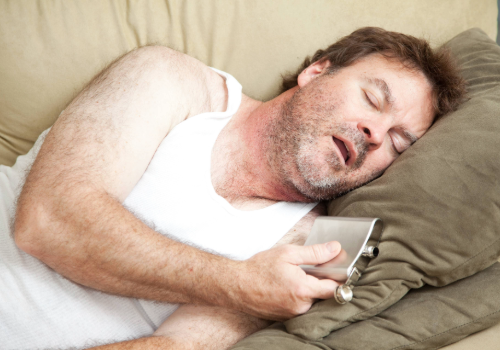
It’s not your imagination — that glass of wine or cocktail before bed really can make you snore louder.
While alcohol can help you fall asleep faster, it also relaxes your throat and airway muscles, making it harder to breathe normally while you sleep. For many people, this leads to snoring — or even more serious sleep disruptions like sleep apnea.
How Alcohol Affects Your Sleep and Breathing
Alcohol acts as a central nervous system depressant, which means it slows brain activity and muscle control throughout the body — including in the throat and tongue.
When these muscles relax too much, your airway narrows or vibrates, creating that familiar snoring sound.
Even small amounts of alcohol can:
- Reduce muscle tone in the throat and upper airway
- Increase airway resistance, making each breath more effortful
- Decrease the brain’s ability to respond to oxygen drops, leading to shallow breathing or brief pauses
If you already snore or have mild sleep apnea, alcohol can make symptoms worse — even after just one or two drinks.
Why Snoring Gets Worse After Drinking
1. You enter deeper sleep faster.
Alcohol suppresses rapid eye movement (REM) sleep and pushes you into deeper sleep stages, where muscles are even more relaxed.
2. Your body’s reflexes are slower.
Normally, your brain triggers micro-arousals to reopen the airway when it collapses. Alcohol delays this response, so snoring lasts longer.
3. You may sleep on your back.
Alcohol can make you less aware of your position. Lying on your back increases airway collapse and vibration, especially in people with narrow airways.
Alcohol and Sleep Apnea Risk
Regular drinking — particularly close to bedtime — can increase your risk for obstructive sleep apnea (OSA), a disorder where breathing repeatedly stops during sleep.
In people already diagnosed with OSA, studies show alcohol can increase the number and duration of apnea events by as much as 25–40%.
Signs that your snoring may indicate sleep apnea include:
- Gasping or choking during sleep
- Morning headaches or sore throat
- Daytime fatigue despite a full night’s sleep
- Irritability, poor focus, or “brain fog”
If these sound familiar, it’s time to talk to a doctor about a sleep evaluation.
Tips to Reduce Snoring After Drinking
You don’t have to give up alcohol entirely — but moderation and timing make a big difference.
Try these sleep-smart habits:
- Stop drinking at least 3 hours before bedtime.
- Stay hydrated; dehydration makes nasal and throat tissues stickier and more likely to vibrate.
- Sleep on your side instead of your back.
- Avoid heavy meals and alcohol together.
- Use a humidifier or nasal strips if congestion adds to your snoring.
If snoring continues even without alcohol, ask your Primary Care Provider or a Sleep Medicine specialist about an overnight sleep study or lifestyle-based treatment options.
Better Sleep Starts with BASS Medical Group
At BASS Medical Group, our Primary Care and Sleep Medicine specialists help patients identify the cause of their snoring and create personalized care plans.
Whether your snoring stems from alcohol use, nasal congestion, or sleep apnea, we’re here to help you sleep (and breathe) easier.
Schedule an appointment today to learn how you can improve your sleep quality and reduce snoring for good.
Frequently Asked Questions
1. Why does alcohol make you snore more?
Alcohol relaxes the muscles in your throat, causing your airway to narrow and vibrate as you breathe. This increases the frequency and loudness of snoring.
2. Can cutting back on alcohol reduce snoring?
Yes. Avoiding alcohol before bedtime often reduces or eliminates snoring, especially for people with mild symptoms or occasional snoring.




